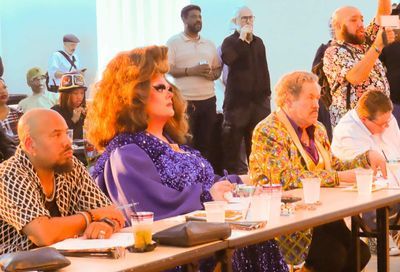Equal Protection Victory
Commentary: Center Field
The California Supreme Court’s May 15 ruling ending marriage discrimination is remarkable not just for the fact of victory, but for the strength and sweep of Chief Justice Ronald George’s arguments supporting his declaration that ”the California Constitution properly must be interpreted to guarantee this basic civil right to all Californians, whether gay or heterosexual, and to same-sex couples as well as to opposite-sex couples.”
New York Law School Professor Arthur S. Leonard wrote, ”For the first time in the United States, an appellate court of final jurisdiction has ruled that sexual orientation is a ‘suspect classification’ for purposes of equal protection under a state constitution.” This subjects statutes discriminating on that basis to strict scrutiny, requiring a compelling state interest to justify the discrimination.
The court invoked its own landmark 1948 decision in Perez v. Sharp, which overturned California’s anti-miscegenation law two decades before the federal Loving decision.
The court rejected the notion that same-sex marriage is a threat to heterosexuals: ”While retention of the limitation of marriage to opposite-sex couples is not needed to preserve the rights and benefits of opposite-sex couples, the exclusion of same-sex couples from the designation of marriage works a real and appreciable harm upon same-sex couples and their children.”
During oral arguments on March 4, Therese M. Stewart, representing the City and County of San Francisco, refuted the ”tradition” argument: ”Here we’re not talking about a tradition of men and women joining together in marriage. … The tradition that we’re talking about is the tradition of excluding lesbians and gay men from the institution.” The court agreed, concluding that ”retention of the traditional definition of marriage does not constitute a state interest sufficiently compelling, under the strict scrutiny equal protection standard, to justify withholding that status from same-sex couples.”
Dismissing as ”sophistic” the religious right’s assertion that restrictive marriage laws are not discriminatory because gays can marry someone of the opposite sex, the court wrote that ”making such a choice would require the negation of the person’s sexual orientation.”
The court rejected immutability as a requirement for suspect classification: ”California cases establish that a person’s religion is a suspect classification for equal protection purposes, and one’s religion, of course, is not immutable…. Because a person’s sexual orientation is so integral an aspect of one’s identity, it is not appropriate to require a person to repudiate or change his or her sexual orientation in order to avoid discriminatory treatment.”
The court had some differences with the plaintiffs. It rejected their argument that the marriage restrictions in Proposition 22 applied only to marriages performed outside California, as well as their argument that the restrictions constituted sex-based discrimination. In doing so, however, the court made its ruling broader, declaring that ”an individual’s homosexual orientation is not a constitutionally legitimate basis for withholding or restricting the individual’s legal rights.”
The ruling may have greater impact nationwide than the 2003 Massachusetts ruling, since California grants marriages to out-of-state couples. Some couples plan to invoke the U.S. Constitution’s Full Faith and Credit (FFC) clause to demand that their home states recognize their California marriages. But as Albany Law School Professor Stephen Clark writes, ”There is a consensus among qualified legal scholars … that the FFC Clause does not require interstate recognition of marriages in most cases.” The popular misconception about FFC is also pushed by Republicans, who will undoubtedly resume their cries that the sky is falling in hopes of scaring up votes.
The National Center for Lesbian Rights, Lambda Legal, Equality California and the ACLU issued an FAQ urging couples to consult them before going to court: ”It is always necessary to weigh the chances of success or failure because bad results in lawsuits can cause setbacks and hurt our entire community. We want to increase the chances of winning overall, so it is critical that we work together to have a carefully planned strategy.”
As the legal groups understand, prudence does not require defensiveness about so-called activist judges. Courts are part of our system of government. Ballot measures notwithstanding, the victory in California shows that Massachusetts was not a fluke, that progress is on the march. San Francisco Mayor Gavin Newsom may have been needlessly provocative when he said, ”It’s going to happen, whether you like it or not,” but in the long run he will be proven right. In the short term, though, it’s going to be a bumpy ride.
Richard J. Rosendall is a writer and activist whose work has appeared on Salon.com and the Independent Gay Forum (www.indegayforum.org). He can be reached at rrosendall@starpower.net.
Support Metro Weekly’s Journalism
These are challenging times for news organizations. And yet it’s crucial we stay active and provide vital resources and information to both our local readers and the world. So won’t you please take a moment and consider supporting Metro Weekly with a membership? For as little as $5 a month, you can help ensure Metro Weekly magazine and MetroWeekly.com remain free, viable resources as we provide the best, most diverse, culturally-resonant LGBTQ coverage in both the D.C. region and around the world. Memberships come with exclusive perks and discounts, your own personal digital delivery of each week’s magazine (and an archive), access to our Member's Lounge when it launches this fall, and exclusive members-only items like Metro Weekly Membership Mugs and Tote Bags! Check out all our membership levels here and please join us today!




















